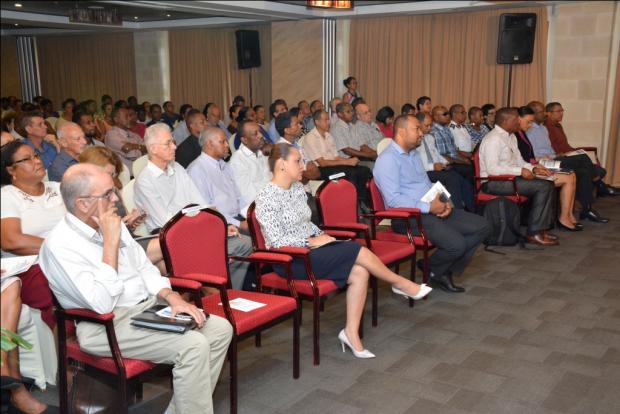Result-based Management Symposium 2017

“Strengthening Public Service Performance: Translating Results-Based Management in to Action” was theme of the Symposium that was held on 22nd June 2017 at Savoy Resort and Spa Hotel at Beau Vallon, on the occasion of Public Service Day. The Symposium was organised partnership with the Ministry of Finance, Trade and Economic Planning and supported by the Word Bank.
The target audience were senior and top executives in the three branches of the State, included the Executive (Principal Secretaries, Chief Executives and deputies of budget dependant organisations, Special Advisors, Financial Comptrollers, Human Resource Directors, Senior Policy Analysts and Principal Monitoring and Evaluation Officers); the National Assembly (Clerk, Financial Controllers and Human Resource Managers); and the Judiciary (Registrar, Financial Controller and Human Resource Manager). The World Bank Team were the moderators for the panel discussions.
The Symposium proceeded with the Opening Remarks by the Consultant of Public Sector Reforms in the Department of Public Administration in the Office of President – Mrs. Helene Maiche, followed immediately by a short presentation on Results-Based Management by Dr Kathrin Plangemann – Lead Public Sector Governance Specialist from the World Bank. The Keynote Address was delivered by the Vice- President – Mr. Vincent Meriton.
Background:
Result-based management is based on four pillars:
- Strategic Planning - Defining a national development strategic direction within which strategic goals will provide a focus for action;
- Programme Based Budgeting - the specification of expected results which contribute to these goals and align programmes, processes and resources behind them;
- Performance Monitoring and Evaluation - on-going monitoring and evaluation of organisational, programme and service delivery performance, integrating lessons learnt into future planning;
- Personnel Management Systems - improve accountability, based on continuous feedback to improve personal performance.
Hence, the Symposium focused on these four key topics:
- Create a roadmap for Success- The Essence of Strategic Planning
- Programme Budgeting for Results – From Line Item to PPBB Statement
- The Nuts and Bolts of Performance Monitoring and Evaluation
- Results-based Personnel Performance – Paving the way forward
These topics are in line with the expected outcomes of the Policy on Results-Based Management which are:
- Focus on results: public entities collect sound data on activities (whether or not these are funded by core budget or by donors) to obtain information which can support informed decisions on public management and new programme proposals.
- Decision-making for results: All organisational activities are strategically linked to clear results aligned to the aims of the organisation. Consequently, sound financial and non-financial performance information is used to make allocation and reallocation decisions across the Government.
- Performing for results: All public-service managers are evaluated on the basis of their ability to deliver results (to be stipulated in their job descriptions), and are held accountable for their performance and their contribution to that of their organisation.
- Planning for results: Decision-makers are able to allocate resources according to government priorities and on the effectiveness of returns. This will provide more power, autonomy and flexibility to successful public bodies and to those managers who deliver results for continuous improvement.
Objectives of the Symposium:
The symposium was dedicated to a common search, for all 4 pillars, for strategies and solutions to establish a culture of managing and performing for results in government. It looked for lessons learnt and good practices nationally and worldwide.
Approach:
The sessions were interactive and represented a broad range of participants and viewpoints. Panel members came from government, youth, technicians, external partners and people currently experiencing one or more of the 4 pillars. The presentation and discussion on each pillar incorporated the views of the participants, their experiences, lessons learnt, alternative models and also international experiences by the World Bank.




